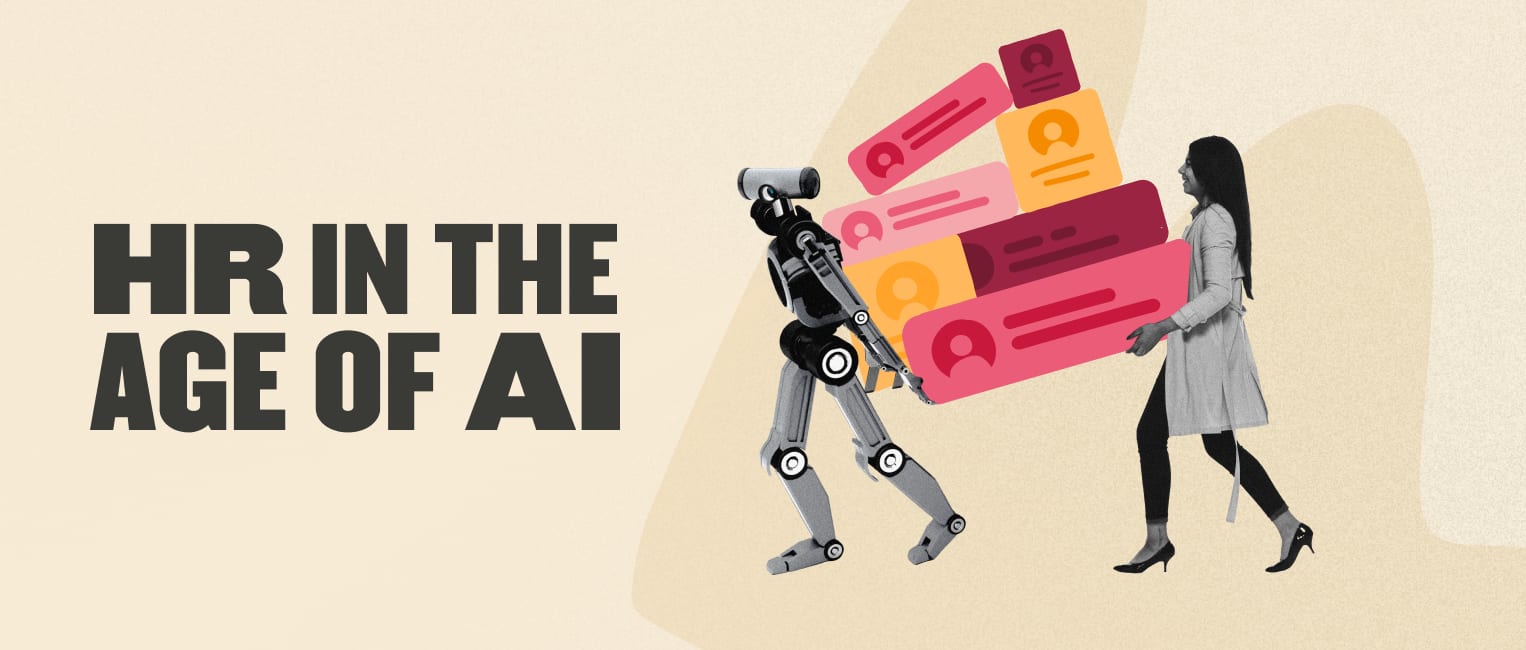Since the debut of ChatGPT in November 2022, the world has been buzzing (with both excitement and nervousness) about its potential impact on everything from childhood development to how businesses are run. One particular question comes up again and again: Will my job be replaced by AI?
For people professionals, this is a gargantuan disruptor to the world of work. In the few months since its debut, it’s already touched nearly every aspect of the HR profession, from workforce planning and company culture to L&D and performance metrics tracking. Not only must HR pros adjust to the new tech and its implications, but they must also respond to and calm panic from talent worried about becoming obsolete.
What’s important for all to bear in mind is that customers and business partners value genuine connections with human beings. Despite AI’s appeal to shrinking budgets and justifying downsizing—especially in rocky economic times—it’s imperative to view it as a tool to help your people boost efficiency, lower stress and burnout rates for everyone (including you and your HR colleagues), and put the focus back on strategy and creative thinking, the pillars of differentiating your business from the competition.
The initial impact of generative AI on the world of work
It’s only been a few months, but a survey of 1,000 business leaders by Resume Builder found that “1 in 4 companies have already replaced workers with ChatGPT” and “48 percent of companies using ChatGPT say it’s replaced workers.”
But just because some companies are replacing humans with AI doesn’t mean all will or should. After all, as HBR puts it, “AI should augment human intelligence, not replace it.”
While it is advantageous to incorporate AI and automation tools to stay competitive, business leaders and HR should beware of “cost-cutting strategies… where machines are introduced as the new super employee that may leave humans ultimately in an inferior role to serve machine.” Instead, the key to “a truly intelligent type of future work” requires human and AI collaboration.
In order to remain relevant and thrive in the future, it’s HR’s responsibility to help their organizations integrate AI into the normal flow of work, using it to boost efficiency and optimize processes to make people’s lives easier and workloads lighter. Not only that, AI can help people boost their creativity and strategic thinking. This applies to all departments across the business—including HR.
Incorporating AI into HR practices
AI in business isn’t new. In fact, some incredible HR automation tech has been making waves in boosting HR efficiency for several years already. Some of the processes and outcomes HR tech can help with include:
- Writing job descriptions
- Gathering and parsing benchmarking information such as salaries and benefits
- Automating tasks (e.g., onboarding)
- Improving employee self-service
- Workforce planning, including recruiting
- Improving communication and workflow
- Performancing and productivity
- Budgeting
- Lowering workloads
- Achieving DEI&B goals
- Tracking burnout levels
- Preventing attrition
- Training and L&D
If this list seems exhaustive, that’s because it is. Nearly every HR task will become faster, easier, and more effective as a result of automation and AI technology, something for HR pros to rejoice about. The bigger challenges, then, are to understand how to mitigate people’s fears of being replaced and use AI to strengthen, not displace, the workforce.
Reskilling and upskilling is key
Despite their fears, humans will always be essential to business operations. After all, the customers will remain human, and they are the ones who businesses must communicate with, impress, and sell to.
It’s become clear that people must learn to work with AI lest they become professionally obsolete. The key is ensuring your workforce knows how to integrate and apply AI tools to optimize efficiency, improve outcomes, and keep up with the demands of today’s (and tomorrow’s) working world.
Here are some important things to keep in mind when devising how to incorporate AI into your regular flow of work:
- Beware of AI inaccuracies. ChatGPT and other generative AIs currently do not promise (or necessarily deliver) factually accurate information. Note that many of AI’s inaccuracies are not only wrong but also harmful, and could easily lead to defamation and privacy lawsuits.
- Don’t lose the human touch. It’s critical to keep up your interpersonal skills and empathy, which are absolutely essential when it comes to creating, growing, and maintaining customer and partner relationships.
- Prepare for anti-AI laws, which are already emerging in the United States, like in New York, which is working on legislation regulating the use of AI in hiring. Federal lawmakers in the US and Europe are also proposing a variety of possible regulations for the use of AI in business.
- Prepare for new career paths. Chief AI officer, anyone? As fears of AI replacing workers abound, new roles revolving around the ability to understand, wrangle, and implement AI arise, such as digital transformation, data labeling, and prompt engineering.
Recommended For Further Reading
The times they are a’changing in the HR space
There is no debate: AI is unequivocally changing the fabric of the work world forever, and it’s up to HR to figure out how to think and operate under the conditions and circumstances AI is creating.
Within the HR department, generative AI can offload much of the administrative burden, cutting down on time and pressure to allow HR professionals to focus on more strategic tasks, relieving stress and burnout.
In the grander scheme of things, AI is a tool professionals must now learn to incorporate into their daily workflow—and while it can never replace the innovation people bring to their brands, it can offload the burden of repetitive and inane administrative tasks. It’s up to HR to help their organizations adjust, placing a heavier emphasis on upskilling and reskilling to keep talented professionals skilled, relevant, and creative—the essential components of business agility, no matter what comes next.


